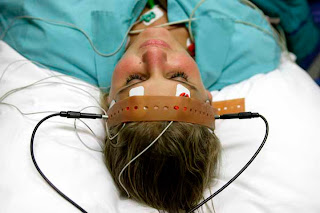
Treatment resistance or better treatment failure with antidepressant medication does not predict acute remission status with ECT for nonpsychotically depressed patients.
The influence of antidepressant treatment failure and response to subsequent ECT has been a point of discussion in the international scientific literature for the last decade. The research group of the Columbia University New York has found that depressed patients who have been exposed to at least one adequate antidepressant trial without response have markedly lower remission rates with ECT compared to those without such a trial.
Other studies did not find such a difference in response between medication resistant and non medication resistant depressed patients. With depression the unipolar form is mostly meant.These reports are mainly from the "old continent", Europe.
This is one of the first US publications with results in the line of the latter group.
Method
This research was part of the CORE study (The Consortium for Research in Electroconvulsive therapy).
They recorded treatment failure with antidepressants used during the index depressive episode with the Antidepressant Treatment History Form (n=345)before ECT.
Response to ECT was assessed with the 24-item Hamilton Rating Scale for Depression. Baseline medication treatment failure was analyzed as a possible predictor of remission status.Remission was defined as an at least 60% reduction of baseline on the HRSD and 2 consecutive ratings of less than or equal to 10.Patients were divided in a resistant and a non resistant group. Antidepressant resistant means a score of 3 or higher on the ATHF. You can score a 3 when you have had an adequate dosage of an antidepressant for at least 4 week.
Results
66.4% of patients were treatment resistant (ATHF 3 or higher), No statistical significant relationship was found between remission and resistance status.Adjustment of the analysis for moderating effects of demographic and clinical data as well as adjustment for interaction terms to evaluate effect modification with Bonferoni correction did not influence outcome.
Limitations
1. Not all patients had an ATHF completed
2. Arbitrary definition of treatment resistance
3. Retrospective collection of information on doses and durations of medications used.
I strongly believe based on these trials and the limitations of the studies from the Columbia University group that medication treatment failure doesn't influence the efficacy of subsequent ECT. The biggest challenge however is to keep these patients well after the acute treatment effect. To my opinion we should focus more on the longer term of ECT and develop treatment programs specific for his group after the first success. Day programs with running therapy, cognitive therapy focused at dealing with memory complaints at first followed by eclectic interventions such as Interpersonal psychotherapy, family therapy, relapse prevention.
Article discussed:
J Clin Psychiatry. 2007 Nov;68(11):1701-6.
Antidepressant medication treatment failure does not predict lower remission with
ECT for major depressive disorder: a report from the consortium for research in
electroconvulsive therapy.
Rasmussen KG, Mueller M, Knapp RG, Husain MM, Rummans TA, Sampson SM, O'Connor
MK, Petrides G, Fink M, Kellner CH.
PMID: 18052563![]()
Antidepressant Medication Treatment Failure Does Not Predict Lower Remission With ECT
Antidepressant Medication Treatment Failure Does Not Predict Lower Remission With ECT
Antidepressant Medication Treatment Failure Does Not Predict Lower Remission With ECT
Antidepressant Medication Treatment Failure Does Not Predict Lower Remission With ECT
Tuesday, December 11, 2007
Antidepressant Medication Treatment Failure Does Not Predict Lower Remission With ECT
Posted by
Dr. Shock
at
7:51 PM
![]()
Labels: ECT electroconvulsive therapy electroshock Depression Unipolar Treatment-resistant-depression
Subscribe to:
Post Comments (Atom)







No comments:
Post a Comment